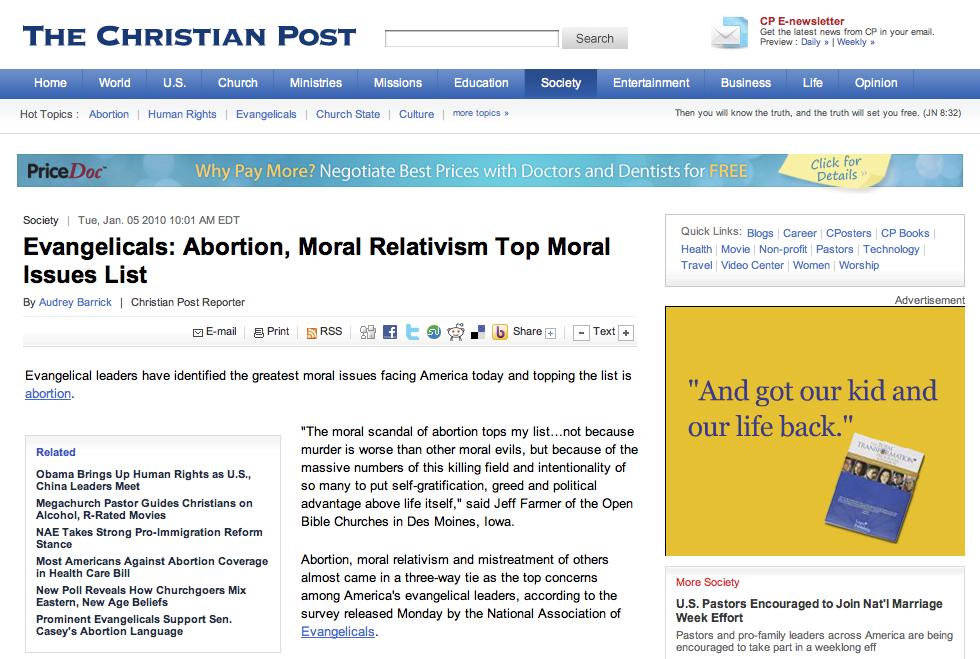 Joel Hunter was an unlikely ally of Barack Obama’s in the 2008 election. The Christian evangelical, who leads a mega-church in central Florida, had backed fellow pastor Mike Huckabee in the Republican primary that year. At Obama’s inauguration, Hunter found himself sitting next to Muhammad Ali in the 12th row.
Joel Hunter was an unlikely ally of Barack Obama’s in the 2008 election. The Christian evangelical, who leads a mega-church in central Florida, had backed fellow pastor Mike Huckabee in the Republican primary that year. At Obama’s inauguration, Hunter found himself sitting next to Muhammad Ali in the 12th row.
Obama’s outreach to the faithful during the 2008 campaign—unprecedented for a Democratic candidate—paid off. He did 8 percentage points better than 2004 nominee John Kerry had among voters who worship weekly or more, although he lost regular worshippers overall to Republican John McCain. With strong support from minorities, Obama beat McCain by 9 percentage points among Catholics (who favored George W. Bush over Kerry by 5 points in 2004) and made smaller inroads among evangelicals such as Hunter.
Those gains are now in jeopardy, according to Hunter and other religious leaders fuming over the Obama administration’s requirement that church-affiliated institutions such as hospitals, schools, and charities cover birth control in their employee health insurance plans.
“The boundaries of religious freedom and identity are being trespassed,” said Hunter, who still writes weekly devotions for Obama and visited the Oval Office last week; he said he keeps his spiritual guidance separate from any policy recommendations he funnels to the president. “I do think this will have political repercussions in the religious community,” Hunter added. “This has the potential to be a breaking point.”
Obama’s Republican challengers certainly hope so. Newt Gingrich has accused Obama of waging a “war against religion.” Rick Santorum, a devout Catholic who has put issues such as abortion and marriage at the center of his campaign, used his victory speech after the Missouri primary to accuse Obama of steamrolling the First Amendment.
Campaigning earlier this week in Colorado, front-runner Mitt Romney, said sharply, “We must have a president who is willing to protect America’s first right, a right to worship God.”
The issue is potentially advantageous for Romney, a Mormon who once held moderate positions on abortion and gay marriage, because it allows him to align himself with the social conservatives who have resisted his candidacy. (Both Gingrich and Democrats, however, have called Romney a hypocrite on the birth-control issue. As governor of Massachusetts, he enforced a rule requiring Catholic hospitals to provide emergency contraception to rape victims, after the Legislature overrode his veto of the measure.)
On Wednesday, House Speaker John Boehner put the dispute at the center of his party’s agenda, taking to the House floor to condemn “an unambiguous attack on religious freedom in our country.” He vowed to overturn the provision stemming from Obama’s sweeping health care reform plan. The fight over that legislation has already sorely tested the president’s relationship with religious leaders, who feared that it would allow taxpayer dollars to cover abortion.
To the extent that Republicans succeed in framing the current debate as one over religious liberty, the controversy over the so-called conscience clause could damage Obama at the polls. A perceived threat to religious freedom could pull more-casual churchgoers, who typically lean Democratic, closer to regular churchgoers, who tend to vote Republican, said John Green, a University of Akron political-science professor who specializes in the intersection of religion and politics.
In 2008, exit polls showed that the more frequently white Catholic voters went to church, the less likely they were to favor Obama. He got the votes of only 41 percent of white Catholics who attended church weekly or more; 47 percent of those who attended a few times a month; and 54 percent of those who attended a few times a year or never.
The relationship of religion and politics could influence the outcome of the 2012 election in battleground states with large Catholic communities, including Iowa, Michigan, Missouri, Ohio, Pennsylvania, and Wisconsin, Green added. “The real problem for the Obama administration would be if the [birth-control] issue moved some of those less religious Catholics,” Green said. “The issue might also move the regular Mass-attending Catholics to vote even more Republican.”
But if Democrats win the message war and frame the issue as a matter of public policy that involves women’s health and access to contraception, Republicans may find themselves on the losing side of the argument. In a survey by the Public Religion Research Institute, 52 percent of Catholic voters agreed that employee health plans should cover birth control. The Obama administration is also touting a Guttmacher Institute study that found 98 percent of Catholic women have used birth control.
“Obviously, this is not a war against the Catholic Church. I’m Catholic, and I don’t find that there’s a war against me at all,” said Kathleen Kennedy Townsend, the former Maryland lieutenant governor and a member of one of the nation’s most prominent Catholic families. “This is about women’s health and protecting the rights of all citizens. If Republicans want to fight about contraception being available for women, I think they will be on the wrong side of history and the wrong side of women’s health.”
A Wall Street Journal column this week by three Democratic senators—Jeanne Sheehan of New Hampshire, Barbara Boxer of California, and Patty Murray of Washington—tied critics of Obama’s policy on contraceptive coverage to the decision by the Susan G. Komen Foundation to cut funding to Planned Parenthood. A massive public outcry forced the breast-cancer charity to reverse itself. “Once again,” the senators wrote, “they are trying to force their politics on women’s personal health care decisions.”
Young voters, women, and independents helped to elect Obama in 2008. If Republicans overreach on contraception, those voters will help offset any support the president loses from religiously devout voters, who lean Republican anyway. But if the GOP succeeds in wrapping the issue in the mantle of religious liberty, Obama will struggle to rebuild the diverse coalition that put him in the White House.



